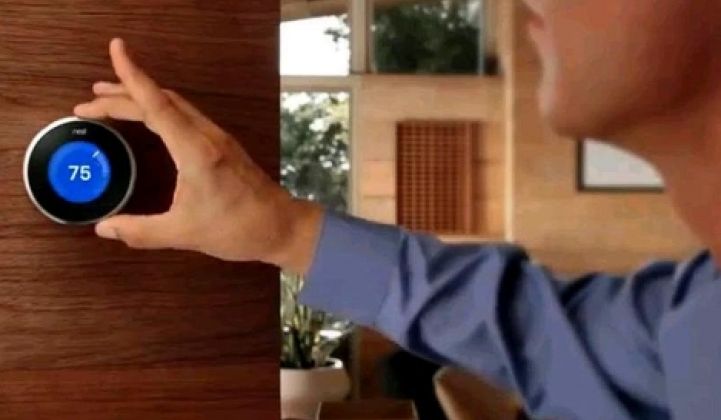SolarCity is the latest solar company to partner with a smart home technology provider in an effort to deepen relationships with customers.
This morning, SolarCity, the country's biggest residential solar installer, announced that it will offer 10,000 Nest thermostats to customers in California. The goal, say the companies, will be to monitor how pairing smart thermostats with photovoltaics can make systems more valuable for homeowners and the grid.
The collaboration is part of Nest's Energy Partner program, which was established in 2013 to help utilities and competitive energy suppliers deploy thermostats for residential demand response. (Nest prefers to call its demand response offering "rush hour rewards.")
Last year, the Google-owned company reported a 55 percent reduction in air conditioning use on average across demand response events.
SolarCity is the first solar provider to integrate energy services through Nest. The company will offer "seasonal savings" to customers by slightly adjusting temperatures over the course of a few weeks during shoulder seasons, thus "teaching" the thermostat to stay at a more efficient (but comfortable) temperature during the peak of winter or summer.
SolarCity will integrate Nest data into its MySolarCity app to help homeowners visualize energy consumption. Over the coming months, SolarCity will start integrating with other devices in the home through the "Works With Nest" developer platform -- potentially allowing it to link up with appliances, LED lights or home-wide control systems.
"This creates the ability to combine information from the thermostat with other devices and link it up to the solar system," said Brian Farhi, the channel partnerships lead at Nest.
Solar installers and technology vendors are increasingly looking to layer more services on top of PV systems.
Last December, SunPower invested $20 million in Tendril as part of a plan to merge energy management software with solar. Over the last year, Enphase Energy has teamed up with Nexia Home Intelligence, ELIIY Power and MyLight Systems to integrate data from microinverters into various energy management software platforms. The company has also developed its own software designed to operate with battery storage to provide more flexibility in the home.
Last September, Sunrun also started offering Nest learning thermostats to customers. However, that partnership was less about smart home integration and more about marketing.
"We’re seeing a fundamental shift in the way solar players are addressing the residential consumer market," said Omar Saadeh, a senior grid analyst with GTM Research. "With heightened competition, SolarCity joins others such as Sunrun and Enphase in addressing both sides of the home energy equation: generation and consumption."
Saadeh documented this shift in a recent report on business strategies in the connected home. Partnerships -- particularly those in solar -- have steadily increased in recent years.
Source: GTM Research's Energy in the Connected Home 2015
Nest's Farhi, who worked in the solar industry for 15 years, said that most U.S. solar companies are interested in offering some kind of energy management tool to customers in order to stay competitive.
"People are starting to recognize that PV alone won't get us to the next level of what the industry can do. If you don't start targeting the rest of home energy, you're eventually going to get pushed out of the market," he said.
Although he couldn't comment on specifics, Farhi also confirmed that battery storage is becoming an increasingly attractive area for partnerships. As solar companies look to offset net metering fees and demand charges imposed by utilities worried about lots of solar on the grid, they're becoming more interested in pairing solar and batteries to smart devices in the home.
"Many of these companies are now looking very seriously at storage. When you consider fixed charges, dealing with them has a lot to do with load management," said Farhi.
The SolarCity-Nest relationship is yet another step toward making solar a much more sophisticated actor in the home and on the electric grid.
"In the not-so-distant future, we could see a very capable bundled SolarCity home offering, possibly including Tesla residential battery storage, Nest energy management, and solar generation -- all under some sort of financing agreement," said Saadeh.
Brian Farhi will join GTM Research VP Shayle Kann to talk about solar in the connected home at this week's Solar Summit in Phoenix. If you can't join in person, watch the livestream here.




